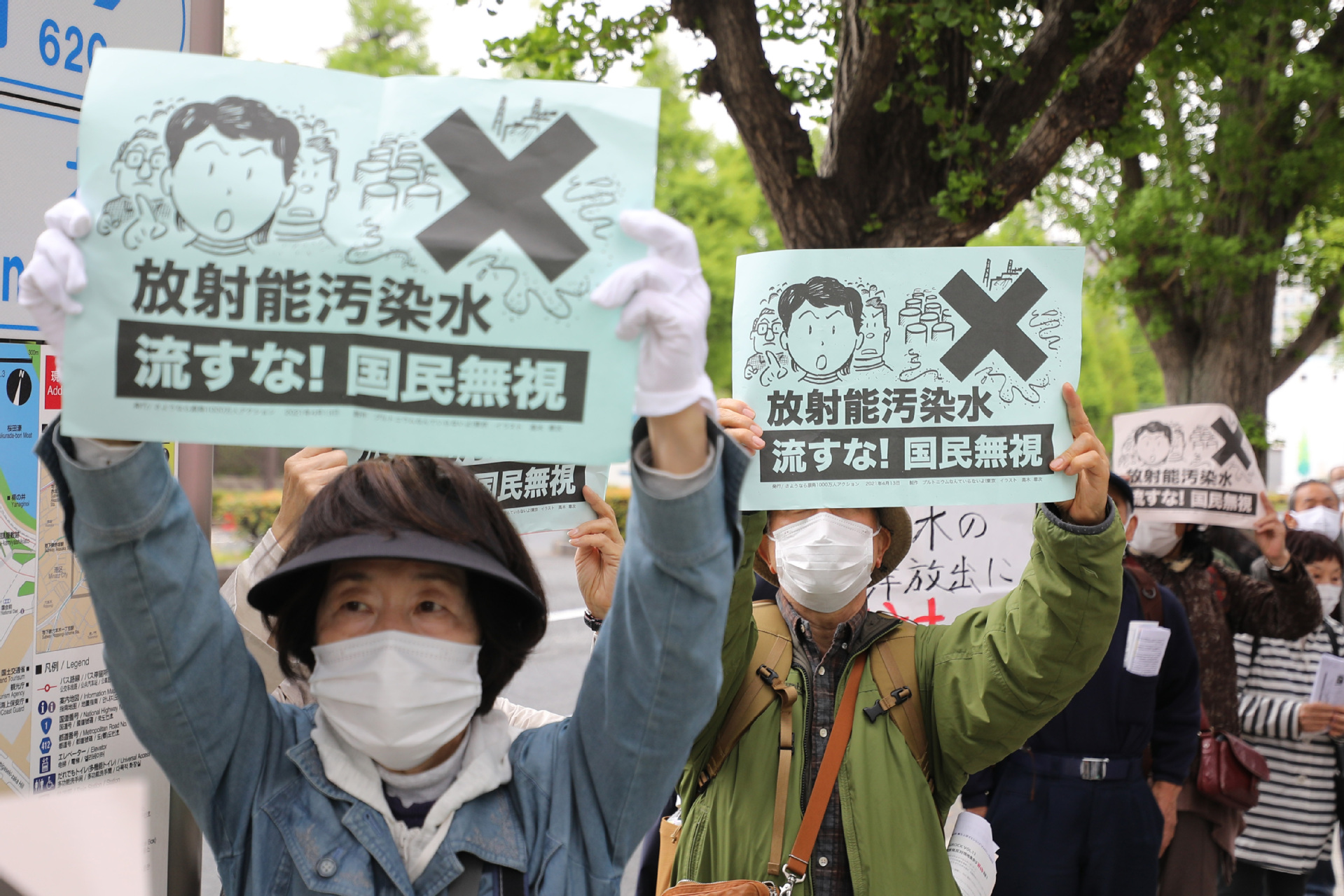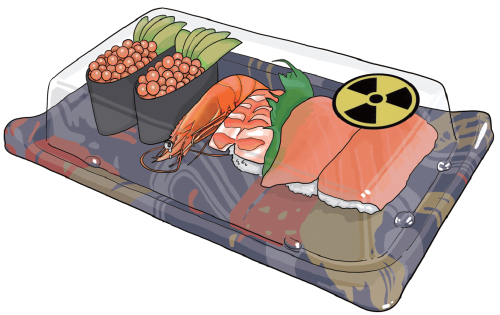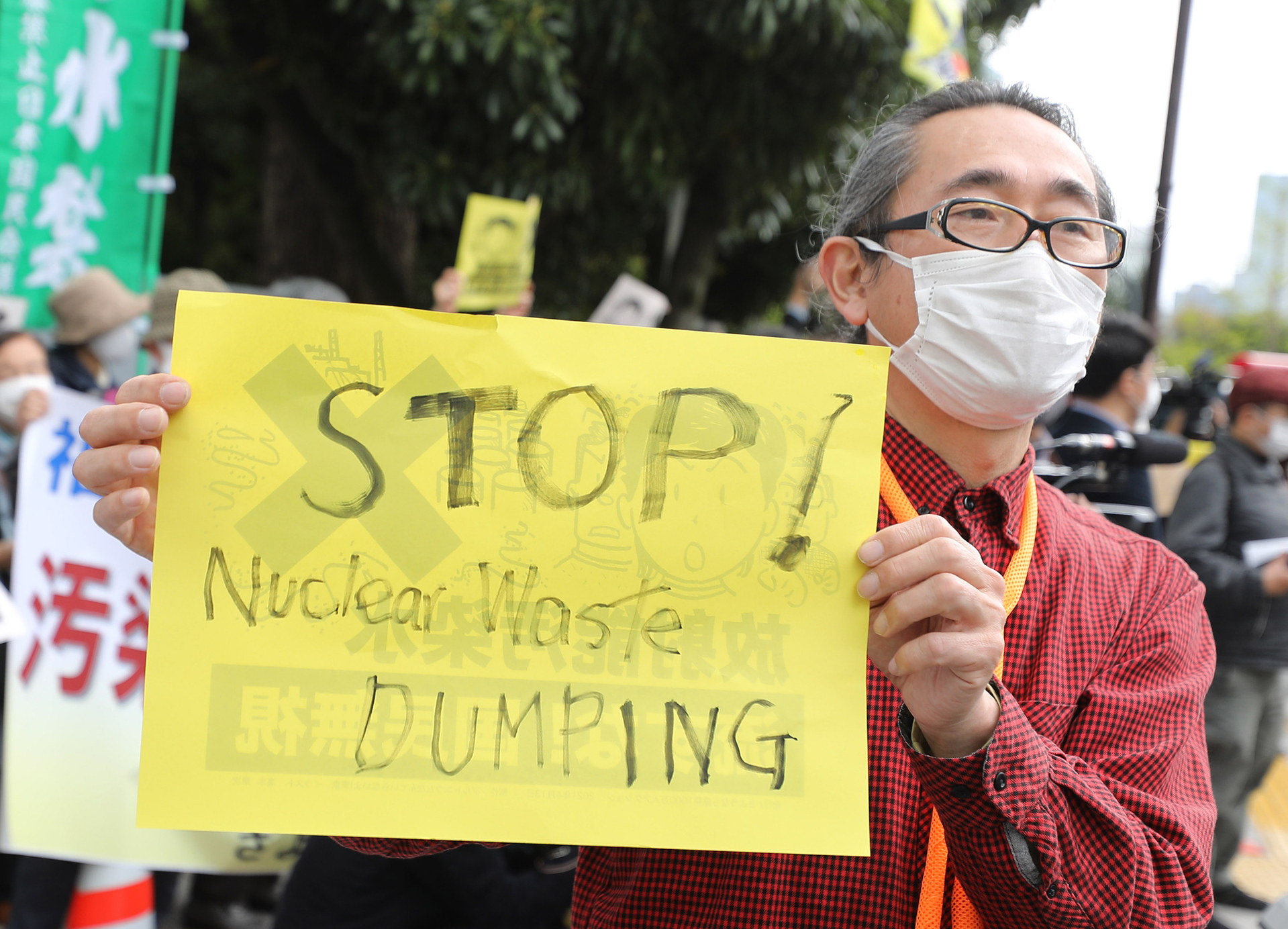4月13日,日本政府决定以海洋排放方式处置福岛核电站事故核废水。
Japan's government announced Tuesday it would start releasing treated radioactive water from the wrecked Fukushima nuclear plant into the Pacific Ocean in two years.
日本政府4月13日宣布,两年后开始将损毁的福岛核电站的放射性污水排放入太平洋。
【词汇讲解】
Wreck作动词时表示“破坏、损坏、损毁”等意思,比如:Our greenhouse was wrecked in last night's storm.(昨晚的暴风雨把我们的温室给毁了);所以上文中的wrecked Fukushima nuclear plant就是指“被损毁的福岛核电站”,如果表达完整可以说Fukushima nuclear plant that was wrecked by the earthquake and tsunami in 2011。Wreck用作名词的时候就可以表示“(已经损毁的汽车、船只等)残骸”,比如:Divers exploring the wreck managed to salvage some coins and jewellery.(发掘船只残骸的潜水队员抢回来了一些钱币和珠宝)。
It's a move that's fiercely opposed by fishermen, residents and Japan's neighbors.
此举遭到日本本国渔民、居民以及邻国的强烈反对。

4月13日,抗议者在日本东京的首相官邸外反对福岛核污水排入大海。
我国外交部发言人在4月14日的例行发布会上表示:
Japan is a contracting party to the United Nations Convention on the Law of the Sea (UNCLOS) and should be aware of the relevant provisions of the Convention. States shall take all measures necessary to ensure that pollution arising from incidents or activities under their jurisdiction or control does not spread beyond the areas where they exercise sovereign rights in accordance with the Convention. However, due to such factors as currents, magnitude, migratory fish, the discharge of Japan's nuclear wastewater into the sea will inevitably cause cross-border impact. In accordance with UNCLOS, the Convention on Early Notification of a Nuclear Accident, and the Convention on Nuclear Safety, Japan is also obliged to undertake such international obligations as notification and full consultation, environmental assessment and monitoring, preventive measures to minimize risks, and information transparency.
日本是《联合国海洋法公约》缔约国,应当知道《公约》有关规定。根据《公约》,各国应采取一切必要措施,确保在其管辖或控制范围内的事件或活动所造成的污染不致扩大到行使主权权利的区域之外。但由于洋流、量级、洄游鱼类等因素,日本核废水排海将不可避免造成跨境影响。根据《联合国海洋法公约》《尽早通报核事故公约》《核安全公约》等,日本还须承担通知并充分协商、环评监测、采取预防措施确保危险最小化、保障信息透明等国际义务。
Assessment report of the IAEA expert panel says that the treated water from the Fukushima nuclear plant contains other radionuclides apart from tritium. According to Tokyo Electric Power Company (TEPCO), the nuclear wastewater contains a total of 62 radionuclides. In August 2018, environmentalists found by analyzing data released by TEPCO that iodine-129 levels went off the chart for 60 times in the year 2017. The amount of strontium in the water is also way over the limit. It is reported that Canada has detected radioactive caesium-134 in salmon from its west coast. In waters near Hawaii, the amount of radioactive materials is twice it was before. These are signs that nuclear pollution from Fukushima may have already spread to North America.
国际原子能机构专家组评估报告明确指出,福岛核电站现有经过处理的含氚废水中仍含有其他放射性核素。据东京电力公司统计,核废水中共含有62种放射性核素。2018年8月,环保人士经过分析东京电力公司发布的数据发现,处理后的核废水远远不止残留氚,其中2017年度的核废水有60次碘129严重超标。核废水中还存在锶90严重超标的问题。据媒体报道,加拿大已经在其西海岸的三文鱼身上检测到铯134放射性元素。在美国夏威夷海域,放射物含量的水平已经达到先前的两倍,有关迹象都表明日本福岛核污染可能已经扩散到北美地区。
The oceans are not Japan's trash can; and the Pacific Ocean is not Japan's sewer. Japan should not expect the world to pay the bill for its treatment of wastewater. As for the individual Japanese official's remarks that the water is okay to drink, why doesn't he take a sip first? The lesson from Japan's Minamata disease is not far behind us. Many local victims have yet to walk out of the pain. Japan should not forget this tragedy, still less should it pretend to be ignorant. We strongly urge Japan to face up to its responsibility, follow the science, fulfill its international obligations and duly respond to the serious concerns of the international community, neighboring countries and its own people. It should reevaluate the issue and refrain from wantonly discharging the wastewater before reaching consensus with all stakeholders and the IAEA through full consultations. China reserves the right to make further reactions.
海洋不是日本的垃圾桶,太平洋不是日本的下水道。日方处理核废水不应让全世界买单。至于你提到日方个别官员称“这些水喝了也没事”,那请他喝了再说。日本水俣病殷鉴不远,当地受害民众的伤痛还未抚平。日方不应忘却历史悲剧,更不应揣着明白装糊涂。我们强烈敦促日方认清自身责任,秉持科学态度,履行国际义务,对国际社会、周边国家以及本国国民的严重关切作出应有回应。日方应重新审视福岛核电站核废水处置问题,在同各利益攸关国家和国际原子能机构充分协商并达成一致前,不得擅自启动排海。中方保留进一步作出反应的权利。
【词汇讲解】
Discharge这个词是表示否定的前缀dis+charge组成的,charge表示“负责、承担、充电”等意思,而discharge就表示“卸职、释放、排放”等相反的意思,比如:discharge a prisoner(释放犯人),vehicles discharging exhaust fumes(机动车排放废气),discharge a cargo ship(给货船卸货),discharge an employee(解聘一名员工)等。

中国日报:金鼎
4月15日,商务部新闻发言人表示,
China will closely watch the knock-on effects caused by Japan's unilateral decision to discharge contaminated nuclear wastewater from the Fukushima nuclear power plant into the sea. The country will also carefully assess the serious threats the dumping may present to the safety and trade of related food and agricultural and aquatic products, to ensure the safety of Chinese consumers.
日本政府单方面作出以排海方式处置福岛核电站废水决定,商务部将密切跟踪事态发展,认真评估可能对相关食品及农水产品安全和贸易造成的严重威胁,保障中国消费者安全。
4月15日,外交部发言人再次就此问题回答记者提问时表示,
Yesterday, the first meeting of the China-ROK dialogue and cooperation mechanism of maritime affairs was convened. The two countries urged Japan to fully consult with international institutions and neighboring countries, and prudently handle the issue on the basis of substantive participation by relevant countries and international institutions. This is the common position of the two sides. It is extremely selfish that Japan wantonly and unilaterally decided to release the nuclear wastewater into the sea and shift the burden and risks onto others in disregard of the safety and interests of the international community, its Asian neighbors in particular. To protect the health of their own people and international marine environment, China and the ROK, as Japan's close neighbors and stakeholders, expressed grave concerns and strong dissatisfaction. This is perfectly natural and justified.
昨天,中韩海洋事务对话合作机制举行首次会议。双方敦促日本务必在与国际机构和周边国家充分协商,并在有关国家和国际机构实质参与基础上,审慎处理福岛核废水问题。这是中韩两国的共同立场。日方擅自单方面决定把核废水排入海洋,对外转嫁负担和风险,置国际社会特别是亚洲近邻安全利益于不顾,极其自私自利。作为日本近邻和利益攸关方,中韩两国为维护本国人民身体健康和国际海洋环境,对日方不负责任的做法表示严重关切和强烈不满,天经地义、理所当然。
A German marine scientific research institute pointed out long ago that with the world's strongest currents along the coast of Fukushima, radioactive materials could spread to most of the Pacific Ocean within 57 days from the date of discharge, and reach all oceans of the globe in a decade. What gives Japan the confidence and makes it feel it's in a position to accuse other countries of failing to obtain "scientific proof"? Some Japanese politicians spared no effort to prove that the nuclear wastewater is harmless, then they should use the water for drinking, cooking, laundry and irrigation; guarantee that sea food won't be contaminated; and accept the advice of the International Atomic Energy Agency and set up a technical working group with relevant countries including China and the ROK to make assessment.
德国海洋科学研究机构早已明确指出,福岛沿岸拥有世界上最强的洋流,从排放之日起57天内,放射性物质将扩散至太平洋大半区域,10年后蔓延至全球海域。日方有什么底气和资格指责其他国家“未基于科学依据”?日本一些政客费尽心机想要证明核废水“清白”,那就请他们把核废水用来饮用、做饭、洗衣服或者灌溉,请他们保证海产品不会被核废水污染,请他们接受国际原子能机构建议,同包括中韩在内的有关国家合作成立技术工作组开展评估。
4月15日,外交部部长助理吴江浩召见日本驻华大使垂秀夫,就日本政府决定以海洋排放方式处置福岛核电站事故废水提出严正交涉(lodge solemn representations against the Japanese government's decision to dump the wastewater from the Fukushima nuclear plant into the sea)。
Wu said Japan's relevant decision disregarded the global marine environment, the safety of international public health, and the security interests of people from the surrounding countries. He said such a decision is a violation of international law and rules and should not be a behavior of a modern civilized country.
吴江浩指出,日方有关决定置全球海洋环境于不顾,置国际公共健康安全和周边国家人民切身安全利益于不顾,涉嫌违反国际法和国际规则,不是现代文明国家所为。
"China is strongly dissatisfied with and firmly opposes this decision," Wu said.
中方对此表示强烈不满和坚决反对。
China urges Japan to recognize the responsibilities it shoulders and fulfill its international obligations in a scientific manner, said Wu.
吴江浩表示,中方强烈敦促日方认清自身责任,秉持科学态度,履行国际义务。

4月13日,民众在日本东京的首相官邸外集会,抗议将福岛核污水排入大海。
He said that Japan should review the issue of disposing of the wastewater from the Fukushima nuclear plant and withdraw its decision to dump the wastewater into the sea.
一是重新审视福岛核电站事故废水处置问题,收回排放入海错误决定;
Wu said a joint technical working group, which includes Chinese experts, should be set up under the framework of the international institutions, to ensure that the disposal of nuclear wastewater is strictly under international evaluation, checks, and supervision.
二是在国际机构框架下成立包括中国专家在内的联合技术工作组,确保核废水处置问题严格接受国际评估、核查和监督;
【词汇讲解】
本文中出现的dispose of是一个固定搭配的动词短语,表示“to get rid of”,即“处理、清除、丢弃”等意思,比如:dispose of toxic waste(处理有害垃圾);后面出现的disposal of就是这个短语的名词形式,表示同样的意思,比如:the disposal of hazardous substances(有害物品的处置)。由此衍生出的形容词disposable就表示“可丢弃的,一次性的”,比如:disposable plastic bags(一次性塑料袋)、disposable chopsticks(一次性筷子)等。
Before reaching a consensus with all relevant stakeholders and international institutions through consultations, Japan should not discharge the nuclear wastewater into the sea, said Wu.
三是在同利益攸关方和国际机构协商一致之前,不得擅自启动核废水排海。
He added that China will, together with the international community, continue to closely watch the development of the matter and reserves the right to make further responses.
中方将继续同国际社会一道,密切关注事态发展,保留作出进一步反应的权利。
【相关词汇】
提出严正交涉 lodge solemn representations
严重关切 be deeply concerned about
履行国际义务 fulfill international obligations
环评监测 environmental assessment and monitoring
保留作出进一步反应的权利 reserve the right to make further responses
参考来源:新华网、外交部官网、中国日报网
(中国日报网英语点津 Helen)